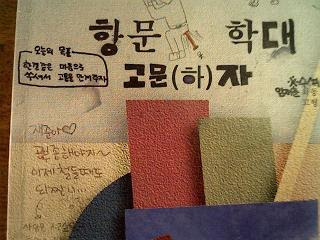In case you haven't noticed, I have a new page on my website, which is an alphabetized list of the Korean slang that I have covered so far, and you can find the link on the sidebar for desktop, and if you scroll down on mobile. Alternatively, just click here for the Korean Slang Dictionary. I plan to add to it as I add more posts here!
If you have spent any time on the Korean internet, you have surely seen the word "짤" or "짤방." It's not too hard to figure out what this is supposed to mean, as the posts are often titled in a straightforward way; for example, a post might be simply titled "웃긴 짤" (or "funny 짤" in English). When you open the said post, it often contains a single photo and nothing else.
Whatever "짤" is supposed to mean, we end up guessing that "짤" means either a photo or a gif after browsing through the internet for a few moments.
Although I knew the meaning of this word for a long time, I only recently found out where this word comes from -- the letter "짤" really has nothing to do with the Korean words meaning pictures. The natural choices would have been "사진" or "gif," after all!
It turns out that the word "짤방" comes from "짤림방지." And "짤" is a further simplification of "짤방." The word "짤림" is already slang for "잘림," which means "being cut."
If you're fired from work, or if you didn't pass the audition, you can say
Here's another context where you can use the word "짤리다." In a moderated website, contents not meeting the requirements of the websites can get censored by the moderators. It could be violent/explicit content, but it could also be an arbitrarily imposed rule. In fact, many Korean websites stipulate that you must include a picture with your posts, in order to increase readability and reduce haphazard posts (In fact, DC Inside automatically inserts a photo!)
So Koreans started inserting random pictures into their posts to prevent ("방지" in Korean) being cut ("짤림" in Korean). And when you post pictures unrelated to the content of your post, you would often just explain that the photo is there to prevent censorship, by typing out:
This usage is incredibly common online, although only among the younger people. On the bright side, it is a non-offensive usage!!
If you have spent any time on the Korean internet, you have surely seen the word "짤" or "짤방." It's not too hard to figure out what this is supposed to mean, as the posts are often titled in a straightforward way; for example, a post might be simply titled "웃긴 짤" (or "funny 짤" in English). When you open the said post, it often contains a single photo and nothing else.
Whatever "짤" is supposed to mean, we end up guessing that "짤" means either a photo or a gif after browsing through the internet for a few moments.
Although I knew the meaning of this word for a long time, I only recently found out where this word comes from -- the letter "짤" really has nothing to do with the Korean words meaning pictures. The natural choices would have been "사진" or "gif," after all!
It turns out that the word "짤방" comes from "짤림방지." And "짤" is a further simplification of "짤방." The word "짤림" is already slang for "잘림," which means "being cut."
If you're fired from work, or if you didn't pass the audition, you can say
나 짤렸어 (I got cut).By the way, the phrase "나 잘렸어" is almost too formal, and most Koreans would actually use the slang "나 짤렸어."
Here's another context where you can use the word "짤리다." In a moderated website, contents not meeting the requirements of the websites can get censored by the moderators. It could be violent/explicit content, but it could also be an arbitrarily imposed rule. In fact, many Korean websites stipulate that you must include a picture with your posts, in order to increase readability and reduce haphazard posts (In fact, DC Inside automatically inserts a photo!)
So Koreans started inserting random pictures into their posts to prevent ("방지" in Korean) being cut ("짤림" in Korean). And when you post pictures unrelated to the content of your post, you would often just explain that the photo is there to prevent censorship, by typing out:
사진은 짤림방지 (photo is preventing censorship)And from this phrase, the usage degenerated into "사진 = 짤림방지 (photo = preventing censorship)" and people started calling "사진" as "짤림방지," soon shortened as "짤방" or "짤."
This usage is incredibly common online, although only among the younger people. On the bright side, it is a non-offensive usage!!















